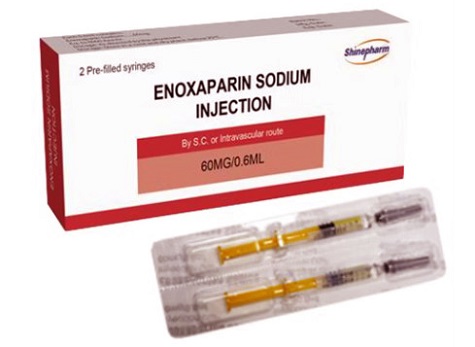Nikhil Prasad Fact checked by:Thailand Medical News Team Nov 17, 2024 11 months, 3 weeks, 14 hours, 20 minutes ago
Medical News: Scientists from the University of Catania in Italy have made intriguing discoveries about the antiviral properties of heparan sulfate (HS) and enoxaparin sodium (EX) against SARS-CoV-2, the virus responsible for COVID-19. Their groundbreaking study explores how these substances, known for their roles in other medical applications, could potentially help mitigate the spread of the virus and treat infections.
 Heparan Sulfate and Enoxaparin Show Promise Against COVID-19
Heparan Sulfate and Enoxaparin Show Promise Against COVID-19
This
Medical News report delves into how heparan sulfate (HS), a naturally occurring glycosaminoglycan, and enoxaparin sodium (EX), a low-molecular-weight heparin widely used as a blood thinner, interact with the virus’s spike protein. Their ability to disrupt viral entry mechanisms highlights their potential to be repurposed as antiviral agents.
Understanding the Science Behind Heparan Sulfate and Enoxaparin
Heparan sulfate is an essential part of cellular structures, playing a crucial role in the initial stages of viral infections. It acts as a bridge, facilitating the virus's attachment to host cells. Enoxaparin, on the other hand, is derived from heparin and has shown the ability to inhibit SARS-CoV-2 by targeting the virus’s spike protein and preventing it from binding to the ACE2 receptor on human cells.
In their study, researchers examined these interactions using in-vitro experiments, computational modeling, and a pseudovirus system that mimicked the real SARS-CoV-2 virus. The results were promising, showing significant reductions in viral entry and absorption when cells or the virus were pretreated with HS or EX.
Key Study Findings on Antiviral Activity
-Low Cytotoxicity of HS and EX
The researchers assessed the safety of HS and EX on lung epithelial cells (A549) using MTT assays. Heparan sulfate exhibited minimal cytotoxic effects even at higher concentrations, with cell viability remaining above 98%. Enoxaparin showed slightly higher toxicity at increased doses but was well-tolerated at therapeutic levels.
-Reduced Viral Entry in Pre-Treatment Studies
In tests where A549 cells were pretreated with HS or EX, both substances effectively blocked the pseudovirus from entering the cells. The antiviral effects of HS were particularly notable, reducing viral absorption by 60% during pre-treatment and nearly 75% during co-treatment scenarios. Enoxaparin, while slightly less effective, still demonstrated significant inhibitory effects.
-Blocking Viral Attachment to Host Cells
Another significant discovery was that pretreating the virus itself with HS or EX before exposing it to cells prevented it from binding to cellular receptors. This indicates that these compounds could potentially neutralize the virus in extracellular environments, making them candidates for prophylactic applications.
Molecular Docking Confirms Strong Interactions
/>
Using computational modeling, the study confirmed that both HS and EX interact strongly with key residues of the virus's spike protein, including Gly496 and Gln498. These interactions were consistent across different SARS-CoV-2 variants, including the highly mutated BA.2.86 and emerging sublineages. This consistency suggests that HS and EX could remain effective against evolving strains.
Broader Implications of the Study
The findings underscore the potential of HS and EX as versatile antiviral agents. Their ability to target viral entry mechanisms provides a dual benefit: reducing viral infectivity and possibly slowing the spread of the virus. Additionally, their established safety profiles in other medical applications make them strong candidates for rapid repurposing in the fight against COVID-19.
The study also raises the possibility of developing topical formulations of these compounds, such as nasal sprays or inhalers, to directly target respiratory infections. This localized delivery method could enhance efficacy while minimizing systemic side effects.
Conclusions
This research highlights the potential of heparan sulfate and enoxaparin sodium as innovative solutions for managing SARS-CoV-2 infections. Both substances effectively inhibit viral entry and absorption, with HS showing particularly robust antiviral activity. The study’s findings are supported by molecular modeling and experimental data, demonstrating that these compounds interact consistently with critical viral structures across multiple variants.
While these results are promising, more research is needed to evaluate the safety and efficacy of HS and EX in clinical settings. Future studies should focus on optimizing dosages, exploring combination therapies, and assessing their performance against other coronaviruses or respiratory pathogens. Given the persistent threat of COVID-19 and the emergence of new variants, these compounds could play a vital role in global antiviral strategies.
The study findings were published in the peer-reviewed journal: Archiv der Pharmazie (Wiley).
https://onlinelibrary.wiley.com/doi/10.1002/ardp.202400545
For the latest COVID-19 News, keep on logging to Thailand
Medical News.
Read Also:
https://www.thailandmedical.news/news/triazavirin-proves-effective-in-treating-covid-19
https://www.thailandmedical.news/news/italian-study-finds-that-aged-garlic-extract-reduces-inflammatory-genes-induced-by-covid-19-infections-or-vaccines
https://www.thailandmedical.news/news/plant-alkaloids-show-promise-against-covid-19
https://www.thailandmedical.news/news/taiwanese-study-finds-that-disulfiram-shows-promise-against-covid-19-and-other-coronaviruses
